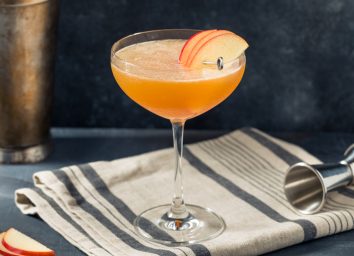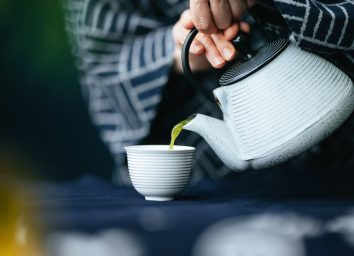
When it comes to shedding pounds and shrinking your waistline, most health-conscious people focus on what they eat—not necessarily what they drink. But now, more experts recommend that you rethink your drinking habits in order to lose belly fat. Here's how switching up your sips can help you shave inches off our waist.
Over the past several decades, calories from beverages have steadily increased. Research shows that our drinks account for more than 20 percent of our daily calories—more than 400 calories—and nearly half of all the sugar we consume, or 10 teaspoons!
Other research also shows just how detrimental too many liquid calories are for maintaining a healthy waistline. This is because beverage calories don't make you feel full or satisfied compared to the exact same number of calories from food. That means calorie-rich drinks up your odds of blowing up your calorie budget, and liquid calories are easily stored as body fat.
The bottom line is that too many empty-calorie beverages can not only cause you to gain weight, they can also up the risk of type 2 diabetes, heart disease, metabolic disorders, and premature death, according to reams of research. If you want to lose weight and keep it off, start by rethinking what you drink. There is no "miracle drink" that will instantly make you slimmer, but if you choose smarter sips, make some healthy food choices, and exercise when you're able, you may be pleased with the changes in your body composition.
Here are 12 better options that will improve the nutritional quality of your diet and help you lose belly fat. They all have the nutrients and bioactive compounds that have been shown in studies to help increase metabolism, tamp down hunger, impact obesity-related hormones, and many other actions to help you shed excess weight.
Water

Water should be the main beverage choice to help you lose weight and keep it off. It's calorie-free, and your body is 50-60% water by weight. The more muscle you have, the higher the water content. A review study published in 2019 reported that weight loss interventions that recommended drinking water in place of sugar-sweetened beverages resulted in an average weight loss of 5.15 percent. Actual weight loss from the water studies ranged from just over 1 pounds to 19 pounds.
An oft-recommended strategy of drinking water at the start of your meals can be an effective weight loss strategy as well. One study published in the journal Obesity reported that among 48 overweight middle-aged and older adult subjects, those who drank about two cups of water before each of their meals while following a calorie-controlled diet lost about 5 pounds more during the 12-week study than dieters who didn't drink water before eating.
Sparkling water
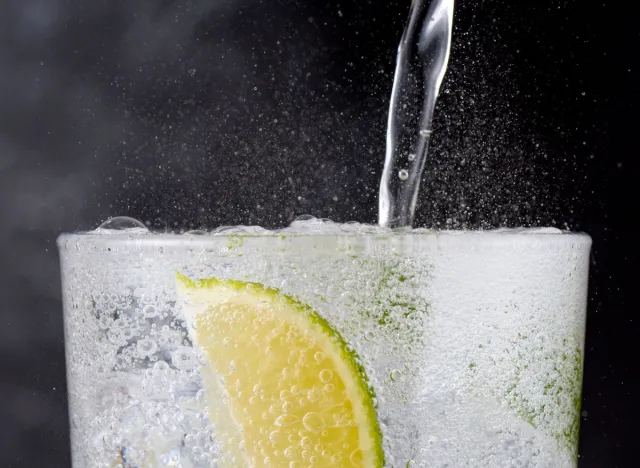
Another option if you want some fizz and excitement to your water is to drink it sparkling. Sparkling water is calorie-free and sugar-free, so it will provide the same shredding benefits of flat water but with more fizz. When choosing a sparkling water, be sure to check the nutrition facts to make sure you are buying carbonated water and not a sparkling water with added sugar.
Green tea
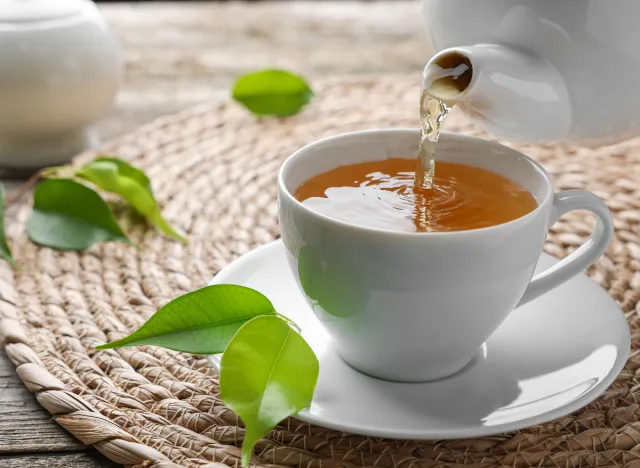
Green tea is often thought of as being the "healthiest" type of tea due to the thousands of studies that extol its health benefits. However, green, black, oolong and white tea all come from the same tea plant, so it's likely all four types of tea impart similar health benefits.
The combination of epigallocatechin gallate (EGCG) (the main catechin in green tea) and caffeine found in green tea can help increase metabolism, boost fat burning, and help the body retain lean body mass while losing weight.
One study published in Clinical Nutrition reported that individuals on a 12-week high dose green tea extract delivering EGCG resulted in reductions in BMI, waist circumference, and the hunger-hormone ghrelin, as well as elevated adiponectin, the hormone that helps your body utilize insulin better. For a refreshing way to lose some inches off your stomach, add some green tea to your daily routine.
Black tea
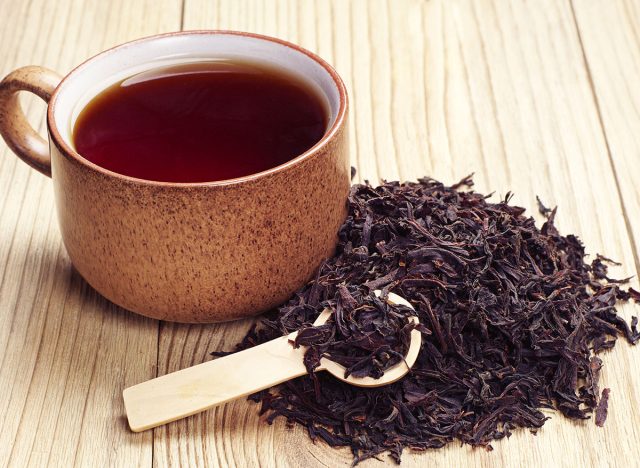
As mentioned above, there are four types of tea that come from the leaves of the Camellia sinensis plant: black, green, white, and oolong. What makes them different is that white and green teas are not oxidized (fermented), while black tea is allowed to oxidize, making it dark and bold.
The type and amount of catechin polyphenols vary based on the type of tea, but studies suggest black tea may help with weight loss and maintenance. One study published in the journal Food & Function found that among 111 adult study participants, those who had three cups per day of tea for 3 months experienced a significant reduction in body weight and waist circumference. Researchers believe the catechins in black tea increase fat metabolism and may improve the gut microbiome to favor weight loss.
Another study reported in Nutrition Research found that among overweight or obese Japanese subjects, those who were given black tea extract three times daily with a barley tea experiences significant reductions in waist circumference and visceral belly fat. The caffeine in tea also can provide a mild lift to your metabolism, which may also help your body burn calories. For the most benefits, drink your tea without added milk or sweeteners.
Kombucha

Kombucha is a type of fermented green or black tea that provides beneficial probiotics. It combines the health benefits of tea, plus the additional health bonuses associated with probiotics, which includes improving the gut microbiome. Many studies over the past several years show that improving the beneficial bacterial in the GI tract can play a role in weight loss through several mechanisms of action. Probiotics may decrease the absorption of fat from food, boost appetite-regulating hormones to help put the brakes on overeating, and can tamp down inflammation that is also linked to excess fat and belly fat.
One study published in the journal Obesity reported that women who were assigned a probiotic while dieting had significantly greater reductions in belly fat, compared to women who were on the same diet but without a probiotic supplement.
Prebiotic soda
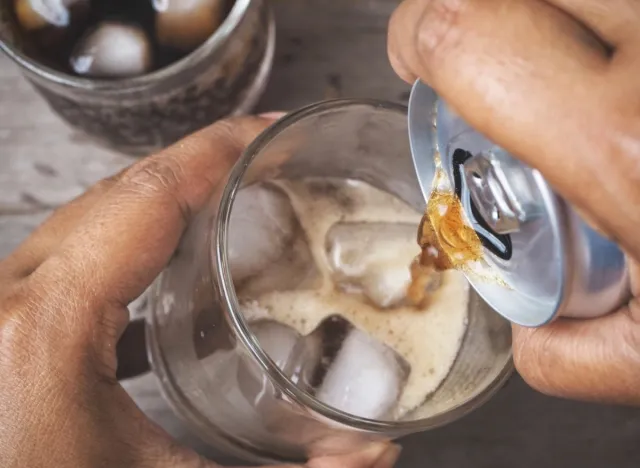
If you're a soda lover and know that you aren't going to be able to give up enjoying a classic cola, root beer, orange, or grape fizzy refreshment, opt for a prebiotic soda alternative. Prebiotic sodas are healthier, bubbly drinks that you can find in specialty as well as mainstream national retailers. Prebiotics are specific types of fiber that feed the beneficial bacteria in your GI tract to help them thrive. By optimizing the beneficial bugs, you will improve your immune system, which may help you lose weight and keep it off. Interestingly, mounting research shows that some thinner individuals have more diverse gut bacteria and more of a specific type of bacteria that appear to impact metabolism compared to overweight or obese individuals.
One of my favorite prebiotic sodas is OLIPOP, due to its refreshing flavors like Classic Root Beer Orange Squeeze and Classic Grape. Not only may the prebiotics help improve the friendly bacteria in your gut, but it will also help you shave hundreds of calories from your diet. A can of regular soda has about 150 calories and 49 grams of sugar (about 10 teaspoons), while a 12-ounce can of OLIPOP has 2-5 grams of sugar (less than 1 teaspoon), 9 grams of fiber, and 35-45 calories.
Black coffee

Coffee is a healthful beverage that delivers tremendous amounts of beneficial antioxidants and other plant-based bioactive compounds to your diet. While research is ongoing, there is evidence that suggests that black coffee or coffee with low-fat milk and no added sweeteners may help you lose belly fat and weight. Researchers theorize that the caffeine and catechins in coffee have a positive impact on your resting metabolism.
A study conducted by the Harvard School of Public Health and reported in the American Journal of Clinical Nutrition found that among study participants who drank four cups of coffee per day, there was an average of a 4% reduction in overall body fat during a 6-month study period. The authors suggest that coffee provided a metabolic lift while potentially acting like an appetite suppressant.
Everyone has a different tolerance for caffeine, so four cups may not agree with you. Start with one or two and monitor how you feel before increasing your coffee intake. Be sure to avoid gourmet coffee drinks that are loaded with calories, added sugars, and saturated fat.
Apple cider vinegar
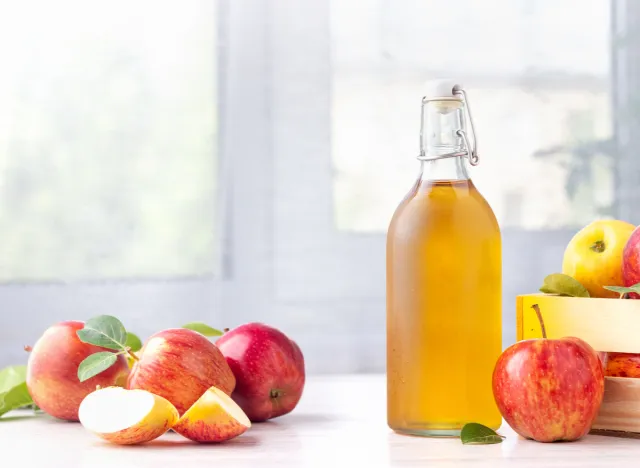
Apple cider vinegar (aka ACV) is often touted in social media to help you lose belly fat. While the beverage won't truly "melt" away fat, there is published research that shows that subjects given acetic acid, the main acid in apple cider vinegar, experienced weight loss, fat loss, and a reduction in waist circumference. The authors concluded that daily intake of vinegar may be a useful tool for weight loss and maintaining healthy blood sugar levels. For best results, try taking 1-2 tablespoons of apple cider vinegar mixed with water or another calorie free beverage before your two main meals, and see how your body weight responds.
Lemon water
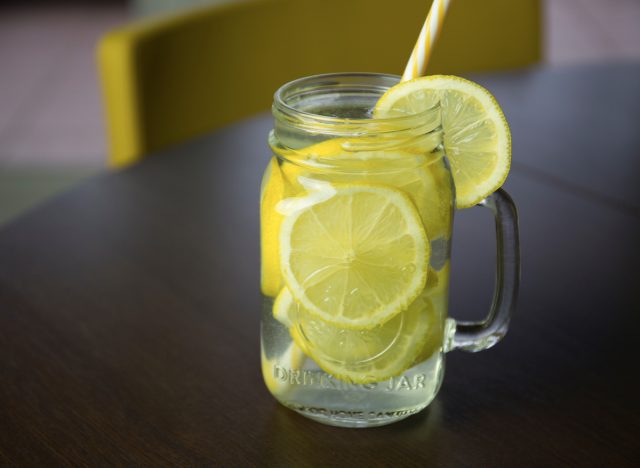
Enjoyed hot or cold before breakfast, lemon water has surprising benefits that may help you lose belly fat. You will benefit from the natural metabolism lift provided by water, but the lemon provides polyphenols that have been shown in animal model studies to stave off obesity when animals are overfed a high-fat diet. One human study reported in Nutrition Journal found that a supplement of hesperidin, the main flavonoid in lemons, coupled with caffeine resulted in increased weight and fat losses. Make your lemon water by squeezing the juice from half a lemon in 8-10 ounces of water. Adding fresh mint, sliced cucumbers, and strawberries will create a refreshing spa water to help you sip yourself slim.
Raw vegetable juice
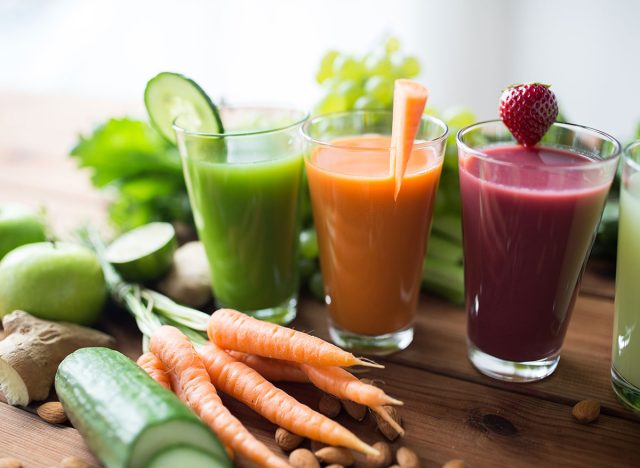
Juicing vegetables is a great way to slim down while getting a boost of beneficial nutrients in your diet. Try to enjoy juice that retains some pulp, as it contains filling fiber that helps slow down digestion to keep blood sugar levels stable and tamp down hunger. Since most of us don't get our daily recommended servings of veggies, a 100% vegetable juice is a great way to up the produce in your diet while helping you lose weight. Some great veggies to juice include carrots, beets, spinach, celery, and kale.
Psyllium water
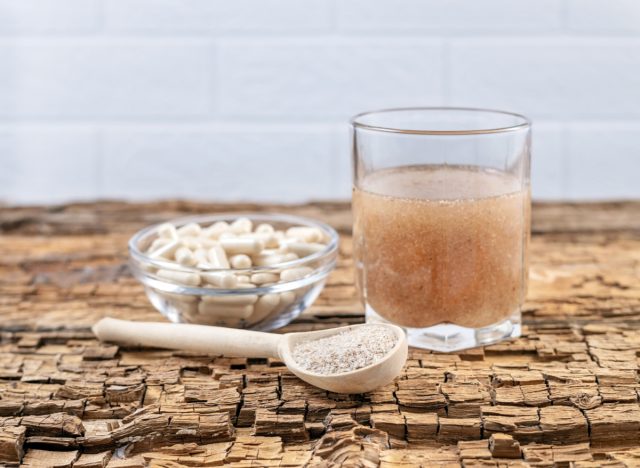
Psyllium husk is a raw compound that functions as a soluble fiber. It has many known health benefits, including reducing cholesterol, controlling blood sugar, and helping to keep you regular. However, several studies also show that psyllium helps to reduce hunger in order to lose belly fat and overall weight. One study reported in Nutrition Journal found that among individuals with type 2 diabetes, those that took psyllium daily for 8 weeks lost more weight and body fat compared to those who did not receive psyllium. Mix psyllium powder into water and enjoy it before meals or at the start of the day to help you feel satisfied for hours.
Milk
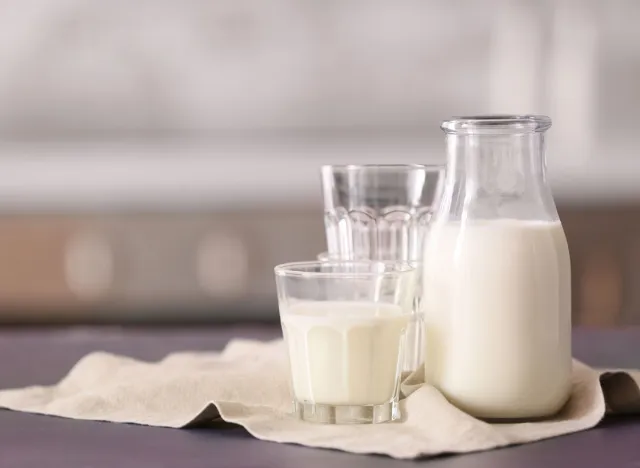
Skim cow's milk packs in plenty of vitamins and minerals, as well as 8 grams of protein per 8-ounce serving. A major meta-analysis of human clinical trials reported in the journal Nutrients concluded that including milk as part of a calorie-restricted diet can result in greater weight loss and fat loss, as well as maintenance of muscle mass compared to when dairy is not included as part of a weight loss protein. The high-quality protein in milk helps you stay fuller longer, and the whey and casein protein are beneficial to retain muscle mass. To keep calories and saturated fat in check, choose skim or 1% milk.
- Source: https://pubmed.ncbi.nlm.nih.gov/18070765/
- Source: https://pubmed.ncbi.nlm.nih.gov/18257753/
- Source: https://pubmed.ncbi.nlm.nih.gov/32529512/
- Source: https://pubmed.ncbi.nlm.nih.gov/31657610/
- Source: https://pubmed.ncbi.nlm.nih.gov/19661958/
- Source: https://bmccomplementmedtherapies.biomedcentral.com/articles/10.1186/s12906-018-2355-x
- Source: https://pubmed.ncbi.nlm.nih.gov/10584049/
- Source: https://pubmed.ncbi.nlm.nih.gov/24889137/
- Source: https://pubmed.ncbi.nlm.nih.gov/21745623/
- Source: https://pubmed.ncbi.nlm.nih.gov/30468509/
- Source: https://pubmed.ncbi.nlm.nih.gov/28008750/
- Source: https://pubmed.ncbi.nlm.nih.gov/23985870/
- Source: https://pubmed.ncbi.nlm.nih.gov/30335479/
- Source: https://pubmed.ncbi.nlm.nih.gov/19661687/
- Source: https://www.ncbi.nlm.nih.gov/pmc/articles/PMC2581754/
- Source: https://nutritionj.biomedcentral.com/articles/10.1186/s12937-016-0123-7#:~:text=Studies%20have%20shown%20that%20daily,taking%20a%20placebo%20%5B19%5D.
- Source: https://pubmed.ncbi.nlm.nih.gov/27733151/


